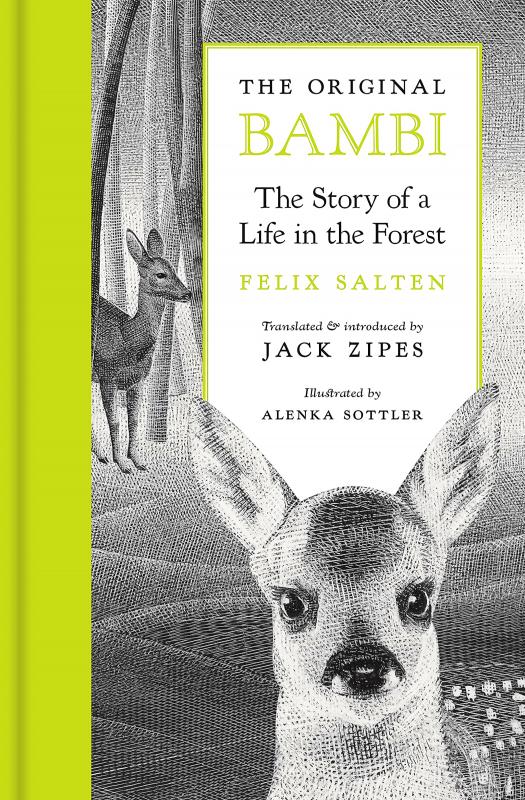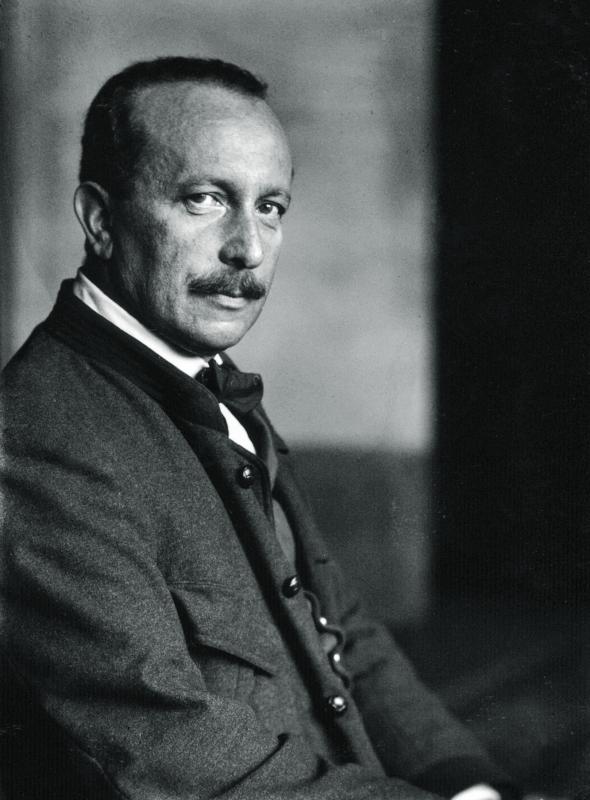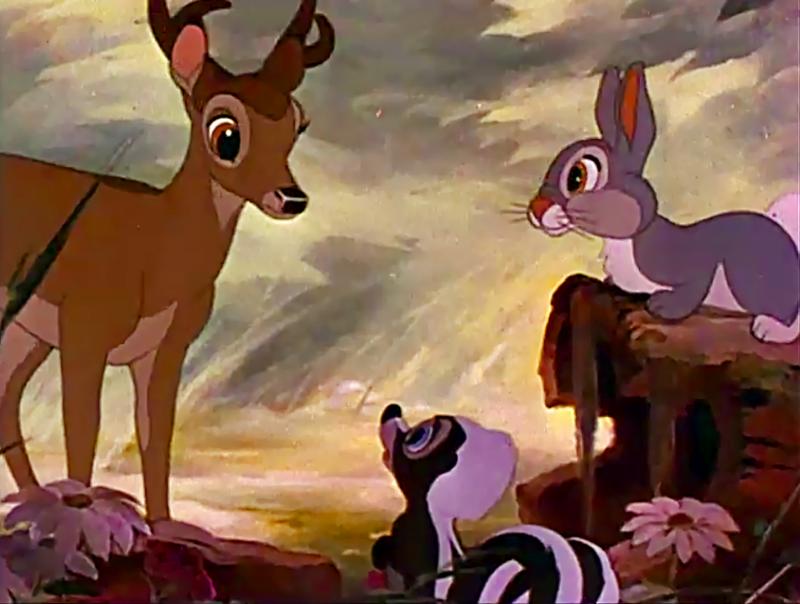It’s a saccharine sweet story about a young deer who finds love and friendship in a forest. But the original tale of Bambi, adapted by Disney in 1942, has much darker beginnings as an existential novel about persecution and antisemitism in 1920s Austria.
Now, a new translation seeks to reassert the rightful place of Felix Salten’s 1923 masterpiece in adult literature and shine a light on how Salten was trying to warn the world that Jews would be terrorized, dehumanized and murdered in the years to come.
Far from being a children’s story, Bambi was actually a parable about the inhumane treatment and dangerous precariousness of Jews and other minorities in what was then an increasingly fascist world, the new translation will show.

Photo courtesy of Princeton University Press
In 1935, the book was banned by the Nazis, who saw it as a political allegory on the treatment of Jews in Europe and burned it as Jewish propaganda.
“The darker side of Bambi has always been there,” said Jack Zipes, professor emeritus of German and comparative literature at the University of Minnesota and translator of the forthcoming book. “But what happens to Bambi at the end of the novel has been concealed, to a certain extent, by the Disney corporation taking over the book and making it into a pathetic, almost stupid film about a prince and a bourgeois family.”
COMPLETELY DIFFERENT STORY

Photo courtesy of Wikimedia Commons
Salten’s novel, Bambi, a Life in the Woods, is completely different, Zipes said. “It is a book about survival in your own home.” From the moment he is born, Bambi is under constant threat from hunters who invade the forest and attack indiscriminately. “They kill whatever animal they want.”
It soon becomes apparent that the forest animals are living out their lives in fear and that puts the reader constantly on edge: “All the animals have been persecuted. And I think what shakes the reader is that there are also some animals who are traitors, who help the hunters kill.”
After Bambi’s mother is murdered, so is his beloved cousin Gobo, who had been led to believe he was special and the hunters would be “kind” to him. Bambi is shot too, but survives thanks to the old prince, a majestic stag who treats him like a son (and may well be his father). But then, sadly, the old prince also dies, leaving Bambi utterly bereft.

Photo courtesy of Wikimedia Commons
“Bambi does not survive well, at the end. He is alone, totally alone … It is a tragic story about the loneliness and solitude of Jews and other minority groups.”
There is a sense at the end that Bambi and all the other wild animals in the forest are merely “born to be killed.” They know they will be hunted — and they know they will die. “The major theme throughout is: you don’t have a choice.”
Salten, who had changed his name from Siegmund Salzmann during his teens to “unmark” himself as a Jew in Austrian society, earned his main income as a journalist in Vienna. Zipes thinks he could see the direction in which the political winds were blowing.
“I think he foresaw the Holocaust. He had suffered greatly as a young boy from antisemitism and at that time, in Austria and Germany, Jews were blamed for the loss of the first world war. This novel is an appeal to say: no, this shouldn’t happen.”
At one point in the novel, two leaves on a tree discuss why they must fall to the ground and wonder what will happen to them when they do.
“These leaves talk very seriously about really dark questions humans have: we don’t know what is going to happen to us when we die. We don’t know why we must die.”
‘THESE ARE HUMAN BEINGS’
By writing a story about animals and wildlife, Salten could get past the negative preconceptions and prejudices many of his readers held about Jews and other minorities: “It enabled him to talk about the persecution of the Jews as freely as he wanted to.”
Without being didactic, he could encourage the reader to feel more empathy towards oppressed groups — and Bambi could openly question the cruelty of their oppressors.
“Many other writers, like George Orwell, chose animals too because you’re freer to tackle problems that might make your readers bristle. And you don’t want them to bristle, you want them to say, at the end: this is a tragedy.”
Importantly, the new translation, which will be published on Jan. 18 by Princeton University Press, attempts to convey in English for the first time the way that certain characters in Salten’s novel have a Viennese “flair” when they talk in German.
“The animals have wonderful ways of talking, which makes you feel as though you are in a Viennese cafe. And you immediately recognize that they’re not talking how animals talk. These are human beings.”
By contrast, the original English translation, which was published in 1928, toned down Salten’s anthropomorphism and changed its focus so that it was more likely to be understood as a simple conservation story about animals living in a forest. This was the version read by Walt Disney, who loved animal stories.
When Germany annexed Austria in 1938, Salten managed to flee to Switzerland. By then, he had sold the film rights for a mere US$1,000 to an American director, who then sold them on to Disney: Salten himself never earned a penny from the famous animation. Stripped of his Austrian citizenship by the Nazis, he spent his final years “lonely and in despair” in Zurich and died in 1945, like Bambi, with no safe place to call home.

Dec. 9 to Dec. 15 When architect Lee Chung-yao (李重耀) heard that the Xinbeitou Train Station was to be demolished in 1988 for the MRT’s Tamsui line, he immediately reached out to the owner of Taiwan Folk Village (台灣民俗村). Lee had been advising Shih Chin-shan (施金山) on his pet project, a 52-hectare theme park in Changhua County that aimed to showcase traditional Taiwanese architecture, crafts and culture. Shih had wanted to build all the structures from scratch, but Lee convinced him to acquire historic properties and move them to the park grounds. Although the Cultural

Supplements are no cottage industry. Hawked by the likes of the Kardashian-Jenner clan, vitamin gummies have in recent years found popularity among millennials and zoomers, who are more receptive to supplements in the form of “powders, liquids and gummies” than older generations. Gwyneth Paltrow’s Goop — no stranger to dubious health trends — sells its own line of such supplements. On TikTok, influencers who shill multivitamin gummies — and more recently, vitamin patches resembling cutesy, colorful stickers or fine line tattoos — promise glowing skin, lush locks, energy boosts and better sleep. But if it’s real health benefits you’re after, you’re

The Taipei Times reported last week that housing transactions fell 15.3 percent last month, to under 20,000 units. However, the market boomed for the first eight months of the year, and observers expect it to show growth for the year as a whole. The fall was due to Central Bank intervention. “The negative impact of credit controls grew evident for the third straight month,” said Sinyi Realty Inc (信義房屋) research manager Tseng Ching-ter (曾敬德), according to the report. Central Bank Governor Yang Chin-long (楊金龍) in October said that the Central Bank implemented selective credit controls in September to cool the housing

Bitcoin topped US$100,000 for the first time this week as a massive rally in the world’s most popular cryptocurrency, largely accelerated by the election of Donald Trump, rolls on. The cryptocurrency officially rose six figures Wednesday night, just hours after the president-elect said he intends to nominate cryptocurrency advocate Paul Atkins to be the next chair of the Securities and Exchange Commission. Bitcoin has soared since Trump won the US presidential election on Nov. 5. The asset climbed from US$69,374 on Election Day, hitting as high as US$103,713 Wednesday, according to CoinDesk. And the latest all-time high arrives just two years after